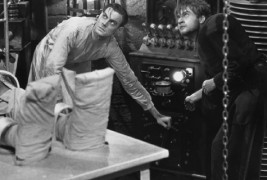
By: Sir Dr. Robert Hibbs (not a real title)
Mad scientists, evil professors, sinister surgeons, psychotic psychiatrists, and murderous M.Ds. exist not just in the dark worlds of horror films but in the darkness of our own reality. Just Google medical accidents, Dr. Francis E. Sweeny for example, Nazi doctors, Angels of Death like the good Doctor Kevorkian, Nazi Doctors or the ghastly Guatemalan penicillin experiments where American public health doctors in the late 1940’s infected prisoners, mental patients, and soldiers with venereal diseases to test the effectiveness of penicillin. That’s mad science in its most heinous capacity, and don’t kid yourself – mad science still exists today.
There’re crazy genetic engineers who work to reanimate dead tissue and the lifeless limbs of para- and quadriplegics through Stem Cell Research, or seek to perfect systems of Cryogenics to push human life closer to the brink of immortality, or scientific teams working on recreating monsters like the Woolly Mammoth I guess just for the hell of it, or robotics engineers like Hiroshi Ishiguro who created his own robotic twin.

At this point you might be asking yourself what all of this has in common. Well, it’s not just that all mad scientists of the 21st Century come from Japan (but they do). This is to give you a loose frame of reference, for my on-going probe into horror movie doctor characters of the past and the present called “Deadly Doctors.”
This first edition of the Deadly Doctor Series focuses on Doctors of the Undead—those few doctors in zombie horror who have either spent their lives involved in aiding the evil from beyond the grave, or trying in vain to control or defeat forces of the undead – and the possibilities about how life could imitate some of these characters’ creations.
The first five doctors to be COMMENDED or CONDEMNED are (in the order I see fit):
Dr. Frankenstein Frankenstein (1931)
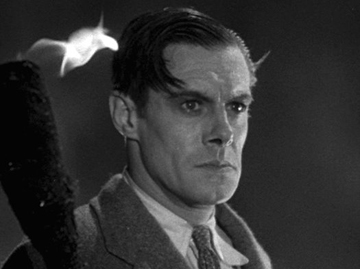
Frankenstein was inspired by a nightmare that Mary Shelley had about a man who attempted to use science to breathe life back into a terrifying figure. That figure of course would become one of the top four most iconic horror images in history (Frankenstein’s monster is ranked number four after Dracula, The Wolfman, and Kim Kardashian). What’s sad is that Doctor Frankenstein usually stands in the shadow of his work, rarely even receiving an honorable mention by most horror fans. Believe me, I understand that the monster is pretty rad, but Doctor Frankenstein needs to be given credit as the basis for every mad scientist character in pop culture today. Now, I’m sure there were stock mad scientists before Dr. Frankenstein’s first appearance in literature BACK IN THE LATE 1820s and his later emergence in cinema in 1931, but I can’t think of a better example to kick off this series than the mad scientist archetype who goes insane playing God.
Before we get into whether he should be condemned or commended, let’s start with the fact that Dr. Frankenstein is loosely based on early 19th century Italian physicist Giovanni Aldini who conducted electrical experiments on dead and sometimes living animals to explore different theories and methods of application regarding galvanism—the process of inducing electrical current to illicit a chemical reaction.
You could say that Frankenstein was the ultimate galvanist, but you don’t have to write bad college lit essays (like this one) to understand that Dr. Frankenstein was a metaphor representing the power-hungry expansionists of the Industrial Revolution, hence the book’s original title Frankenstein: The Modern Prometheus. For the purposes of this character examination, however, let’s focus the scope of the metaphor directly on the relationship between Dr. Frankenstein and his monster to describe the destruction that can occur when man attempts to play God.
For starters, the novel and the movie are about a failed experiment that produces a monster. This general description basically sums up the role and base attitudes of the doctor-characters in most horror films, and it’s why Frankenstein has had a considerable influence across literature and popular culture—having spawned a complete genre of horror stories, films, and of course stock mad scientist characters.
In the process of trying to create or control something that’s beyond our limitations, mad scientists like Dr. Frankenstein and the others in this series only manage to obscure the lines of their own humanity and the constructs of society which results in self destruction and general chaos. When Dr. Frankenstein created what is arguably one of the world’s greatest inventions, a machine that could harness “the very energy of life” and animated a lifeless corpse, he could have opened up new worlds in the study of galvanism, but once he got a taste of the power he was able to harness, he not only brought to life a monster on the operating table, but awakened the monster deep inside of himself (zing?).
Though Dr. Frankenstein’s original intentions were commendable, he did bring a homemade corpse to life. He dug up graves, had his SLAVE steal organs, sewed together body parts, and if he’s okay with the whole “make your own corpse thing” he probably stole all his monster making equipment to boot and couldn’t give two shits where he pulled all that energy from to bring it to life. For all we know the type of lightning Frankenstein harnessed for his experiment tapped into the Earth’s ionosphere caused the great San Francisco Earthquake, and the Tungustka blast of 1909. Not to mention that the energy used brought to life an undead MONSTER that could learn and kill people more effectively than your typical brain-dead zombie.
So, ol’ Frankie’s methods were unsound to say the least, and the consequences of his creation set society back at least twenty years by scaring the crap out of any rational scientist who might have been eager to explore the practical applications of Frankenstein’s techniques. In light of all that, I’m afraid Frankenstein’s actions should be CONDEMNED.
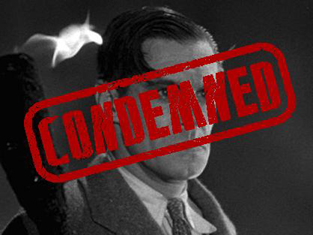
Herbert West Re-Animator (1985)
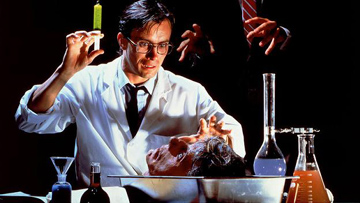
Imagine if a team of scientists were to probe the practical applications of Frankenstein’s technology into the regeneration of new flesh, say in the case of burn victims to turn scar tissue into soft skin once again (that’s what Giovanni Aldini was trying to understand), or using a simple, specialized jolt to give a quadriplegic feeling back in their limbs. When you think about it, Frankenstein’s lighting machine bringing someone back to life could be perceived as a giant defibrillator, only instead of just giving the heart its beat, it gave the brain back its energy—jump started the soul back into existence so to speak. Imagine a machine that could shock people back into consciousness if they went brain-dead on the operating table or were killed in a serious accident. Or how about a drug?
Before Stem Cell research into the reanimation of dead tissue, there was Dr. Herbert West’s “reagent” serum that aimed to reverse the effects of “being dead” at the source by reversing the effects of brain death with a simple injection of the serum directly into the base of the brain.
Now, I know that Herbert West wasn’t a doctor in the first movie–just a med student, but he eventually gets the title of M.D. in sequels Bride of Re-Animator and Beyond Reanimator, and you have to admit that his techniques as a student of medicine were pretty advanced compared to your average M.D. in training.
It’s a given that Herbert West let his pride get the best of him with his obsession to cure death – something that is essentially a natural human process, and by attempting to reverse its effects he turned the process from natural to unnatural. As a result, zombies and mayhem followed him wherever he went, but his dreams of reanimation blinded him to the chaos he created. In the course of the first film, during Herbert’s experiments with the application of reagent serum he:
- caused the death of his former professor Dr. Hans Gruber who was presumably his mentor while studying abroad in Switzerland
- tortured and murdered a friend’s cat
- ruined his only friend’s chances at becoming a doctor and ruined his friend’s long-term relationship by involving him in the murder of the dean of their med school
- and turned an evil professor into a hideous headless monster who triggered a zombie massacre at the new med school he transferred to
All this because of his obsession with being the first man to perfect reanimation and cure death. Pretty ballsy and pretty irresponsible if you ask me.
Herbert’s actions clearly break the 6th vow of the modern Hippocratic Oath which states, “Above all, I must not play at God.” That vow is related to a physician’s grave responsibility in the matters of taking a life, but in Herbert’s case the reverse should’ve been applied. He should’ve been aware of the awesome power at his disposal, and understood that taking life and giving life are both awesome powers that should be handled delicately. However, as I already stated, Herbert was blinded by his obsession much like Frankenstein, but unlike Frankenstein, Herbert was still a student of medicine and sort of a mad scientist in training. He was young, ambitious, and rebellious like most 20-somethings. Herbert was daring to dream the impossible dreams long forgotten by old doctors who’ve become embittered by the world.
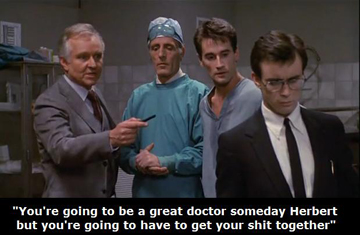
So, the question remains: Should Herbert West’s actions be commended or condemned? Well, how he chose to go after his dreams, more importantly, the poor decisions he made as a result of his judgment being obscured by his obsession should be condemned, but I feel Herbert was only half sure of what he was doing. I think he exuded a false sense of superiority to overcompensate for his lack of confidence and his social anxiety—making his strive for excellence and determination to achieve his dreams of curing death not just admirable, but also courageous. I wish I had just half of the drive and half the courage Herbert West had, so his attitude should at least be fully COMMENDED.
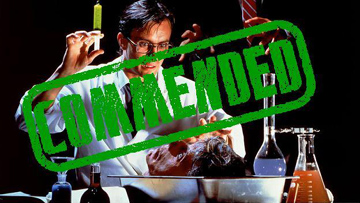
Dr. Dennis Alan Serpent and the Rainbow (1988)
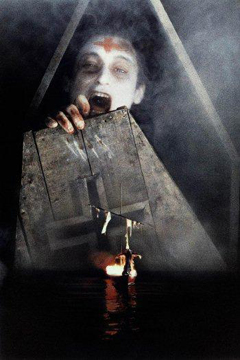
Let’s suppose that Wes Craven’s very loose adaptation of the NON-FICTION BOOK The Serpent and the Rainbow written by ethnobotantist Wade Davis took place just three years after the “Miskatonic University Massacre” in Re-Animator. Perhaps in some small scientific circles word got around about what caused the massacre. Rumors abound about a med student’s nightmare zombie serum, and some of those gossiping scientists get to thinking about practical applications of such a powerful agent.
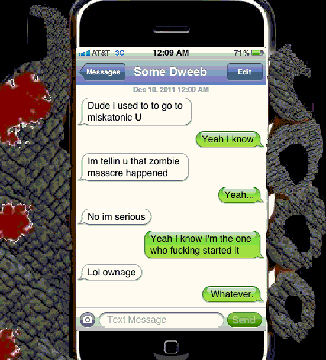
Instead of trying to do the impossible and cure all death, scientists think of applying a more simplified version of a reanimation agent to cure one specific type of death such as anesthetic shock which was a real hot button malpractice issue back in the 80’s causing 50 thousand deaths a year in the O.R.
So any pharmaceutical company that could turn a zombie drug into a new form of anesthesia would not only create a real whiz-bang product that’d net a hefty profit, but take the stress off thousands of surgeons by relieving them of the burden of dealing with medical malpractice lawsuits every time some ungrateful, uncooperative patient keels over on the operating table.
Cut to this real sweet scene with visionary Dr. “Butch” Cassidy head of Boston BioCorp with his partner in crime, Old Alfred here’s a clip. These two slick, forward-thinking men convince Bill Pullman’s character, Dr. Dennis Alan, to hunt down a more down-home reagent that’s more of a zombie spice made with a secret, Haitian voodoo recipe.
In this particular case, Dr. Dennis Alan is not out to play God. He’s been hired by a pharmaceutical company to help them capitalize on playing God, and, in doing so, he embarks on one of the wackiest adventures to take place on screen since A Goofy Movie (one of my fave Jason Marsden films).
Even though Dr. Dennis Allen suffered some serious torture and bravely chose to take on this risky mission into the voodoo world to find zombie powder in the name of science, he did it all for a fat cat pharmaceutical corporation. In his search, he robbed graves, defiled corpses, and pissed off an evil witchdoctor all so Boston Biocorp could turn a profit from reversing the effects of anesthetic shock . Something that by definition seems like more of a problem caused by the human error rather than an allergic reaction. If Boston Biocorp was so interested in saving lives, maybe they would’ve shelled out some clams to fund better education programs to properly train all the anesthesiologists in the 80’s who were overdosing their surgical patients. Instead, they sent Bill Pullman to Haiti to modernize zombie voodoo so doctors could practically “put people into and back out of death,” as if such a process wouldn’t cause any complications.
Yeah, everything worked out in the end for Dennis Allen, but because of the greed factor, I’m going to have to CONDEMN him for his actions. In my eyes, Dennis Allen fancied himself an adventurer like Indiana Jones, but he was nowhere near that level. Indiana Jones never grave-robbed and pissed off witchdoctors for money; he did it for the thrill, and I can use him in this blog as a comparison because Crystal Skull was one of the most gut wrenching horror movies I’ve ever watched. I’ve never seen such a brutal, unnecessarily prolonged death of a character on screen.
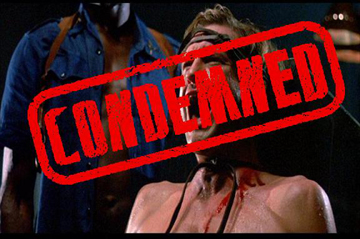
Dr. Logan Day of the Dead (1985)
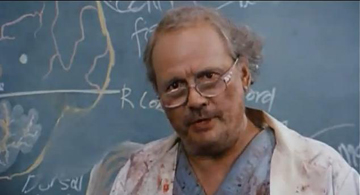
Next up we examine Dr. Logan, appropriately nicked named “Frankenstein,” who arrogantly seeks out a different type of control over the forces of the undead in Day of the Dead—George A. Romero’s third zombie flick. The film takes place in a world where a zombie outbreak has grown completely out of control, and the few scientists hidden underground trying to find a cure are domineered by a skeleton crew of burned out army soldiers. Romero is quoted describing the movie as “[a] tragedy about how a lack of human communication causes chaos and collapse even in this small little pie slice of society.” If we go by Romero’s description, it’s safe to assume that the zombie apocalypse in Day of the Dead occurred because nobody knew who to call or what to say when first word of the undead broke out. The real world killer wasn’t the zombie virus, but the masses of people who became hysterical with cabin fever in their boarded up homes. Most of them went so crazy that being eaten alive by a zombie was sweet relief compared to the torture of losing all control of their interpersonal comm skills, or getting into intense peer mediation sessions between 9-1-1 calls that kept going straight to voicemail. Thank God we live in the Dawn of the Information Age where communicating is easier than ever!
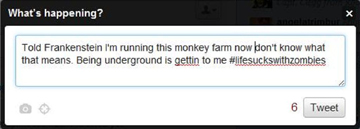
However, Day of the Dead being a tragedy about a lack of human communication makes the most sense in the case of Dr. Logan keeping his zombie domestication experiments shrouded in a bit of mystery (mainly because he didn’t want any of the disgruntled soldiers’ recently deceased friends as dog meat for the undead).
In the movie, Dr. Logan was working independently from the main scientific team lead by female scientist, Sarah, who was fighting a losing battle in her desperate search for a cure for the zombie virus. And then there was Dr. Logan, on the complete opposite side of the spectrum, who got tired of looking for a cure probably three days after they went underground and started working under the mantra, “if you can’t cure ‘em, train ‘em.” He claimed that looking for a cure to the zombie virus was impossible, and that training the zombies to be docile was the way to go. You see, Sarah couldn’t effectively communicate to Dr. Logan that his zombie domestic training experiments would only really work for the zombies in her unfinished movie script called FIDO, and that making the zombies listen to music would do little to quell their primal craving for brains especially because they only had one cassette tape of Milli Vanilli.
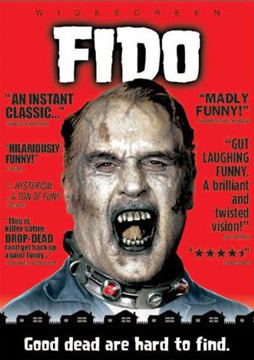
All I’m getting at here is that if Dr. Logan actually told, or even better, asked to use the fresh body parts of the soldiers’ dead friends as dog biscuits for his training technique, or pitched his methods to them as a way to survive above ground, maybe everybody could have worked together as a team and solved some problems. The problem was Dr. Logan went power hungry once he discovered that he could control the zombies. Since the world was full of zombies, he knew deep down that once he perfected his zombie training techniques that he could become ruler of the world, hence all the secrecy regarding his experiments. He was biding his time—waiting for everybody in the group to kill each other so he’d have enough human chum to train his first group of zombie minions.
Moral of the story: if you’re ever in an underground zombie survival outfit (which some of you may be in right now as you read this on your break) and you’re on or around the scientific team looking for a cure, pray that there isn’t a Dr. Logan hoarding fresh cadavers in a meat locker somewhere. If Dr. Logan would’ve just told everybody what he was planning to do from the get go, his actions, given the circumstances, could have been less selfish and more commendable, but he kept things quiet in his lab. He used (and I can’t stress this enough) the recently deceased as puppy treats to train the undead to listen to his commands, and he probably did that because he was a mental patient before the zombies took over. Therefore, his actions are CONDEMNABLE!
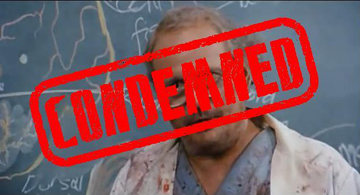
Professor Raymond Knowby Evil Dead II: Dead by Dawn (1987)
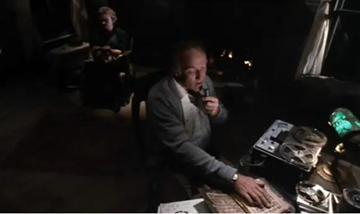
Who needs to use electricity, serums, voodoo powder or extensive domestic training? All you really need is a magical manual—an unabridged volume of evil spells. Preferably, something written by ancient Sumerians that’s bound in well polished human flesh and inked in the finest blood (so you know the text won’t fade over time) so you can bring back anyone or anything from beyond the realm of death with a simple turn of phrase. That’s what Professor Raymond Knowby had in his possession when he “unwittingly” unleashed the forces of darkness onto the world during his translation of the Necronomicon Ex Mortis a.k.a. The Book of the Dead.

Before Ash Williams traded in his severed hand for a chainsaw and got groovy on the evil dead, Professor Raymond Knowby found the Necronomicon (the source of all of Ash’s problems) and brought it back to a cabin in the middle of the woods to translate it. He was so in love with the sound of his own voice that he recorded himself translating passages from the book before taking the time to understand the power the book possessed (probably didn’t even read the foreword by Stephen King).
As a result of his carelessness, he unleashed a demon that possessed his wife who he ended up locking in the basement because he was too much of a pussy to dismember her.
First of all, who knows how long Professor Knowby was out there in the cabin fighting demons before Ash showed up? Was the Professor eventually killed or did he kill himself? Did he run off into the woods and survive? Did he go to Arby’s and try to forget the whole thing? Or did things pretty much pan out the way they did for Ash with the only difference being that Knowby chopped off his possessed foot, and he didn’t get groovy with chainsaw karate kicks.
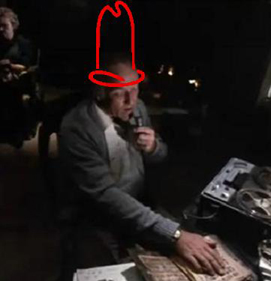
Whatever the case may be, the Professor was a little high on his horse to think that he could translate that book without anything happening. You could try to argue that the demon battle that went down in that cabin was Ashley J. Williams’ fault, but the Professor already unleashed the demons into the world before Ash ever broke into that cabin to bang his girlfriend.
Professor Knowby was your typical, know-it-all, college intellectual who was too arrogant to believe in something as silly as pure evil lurking out there in the darkness. Thanks to Knowby reading the passages, a curse was unleashed that could have destroyed all of mankind (thank God for Ash right?).
That’s why I think Professor Knowby knew what was going to happen when he read those passages. I think he became so obsessed with being the first to find and translate the Necronomican that he went loco during the quest for it, and was so out of his mind when he finally found the damn thing that he took his wife to that cabin (far away from civilized society and witnesses) and used her as a test subject to see what would happen when he translated the possession passages of the book aloud (or maybe he just hated his wife).
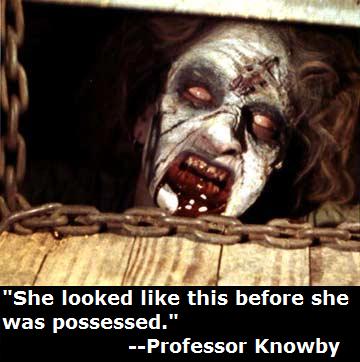
If he had not been so short sighted, desperate to get tenure or obsessed with conjuring up demons and just read the whole book to himself before skipping straight to the demon resurrection passages, maybe some good could have come out of it. We come to find out at the end of Evil Dead 2 that the book has the ability to open portals in time, and in Army of Darkness, the Wiseman knows how to use the book to control those portals. I’m not saying that the Necronomican could have or should have been used to explore space, time, or what may lie beyond the grave, but it could have revolutionized the transportation industry. Think about it, a world without traffic, or the expenses that come with owning a car. All you’d need is a demon portal (used responsibly of course) to zap yourself anywhere you needed to go, and once society was able to get that straight, maybe the NDTPs (Necronomican Demonic Transit Portals) could be used for space and time and all that other crap (I just want to beat rush hour.)
Anyway, since most of my accusations about Professor Knowby’s motives for translating The Book of the Dead are based on a lot of speculation, you could easily argue that Professor Knowby didn’t know what he was doing, and if he didn’t know what he was doing with that book, then I suppose that the only thing I can condemn him for is being an IDIOT.
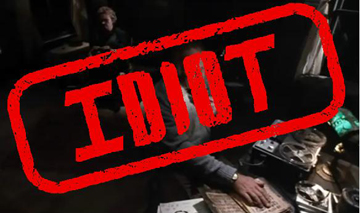
In Conclusion
Now that the five “Doctors of the Undead” have been commended and condemned what can be taken from all of this? Well we’ve learned:
- Most of the world’s mad scientists come from Japan (but that’s common knowledge).
- Don’t raise the dead.
- DO NOT try to uncover the mysteries of death for fame & fortune, power, greed, to satisfy your ego, or the desire for control.
- Ingenuity should be commended but moderation is key.
- Controlled experiments should be conducted when exploring the answer to a hypothesis, and whether you’re an M.D. or a college professor, the sixth tenant of the Hippocratic Oath should be strongly enforced at all times during the course of those experiments.
- Never do things for money especially if they involve going to Haiti.
- There’s no easy to solution when it comes to curing a zombie plague, but fight the good fight when it comes to the extinction of the human race.
- When you find a book full of evil spells, read it quietly to yourself and skim over the ancient incantations if you decide to record an audio version.
Basically, what this list encapsulates is our re-discovery of the simple fact that when you try to play God there’s always going to be hell to pay, and it’s better to put your skills, ingenuity, and strive for power and perfection toward more realistic scientific goals to better serve mankind.
Before you inject a vial full of reanimation juice into the neck of a burn victim, keep a zombie as a pet, fuck around with voodoo, or nuke a homemade corpse to life with super-focused lightning, take a deep breath and think about what you’re doing and what may happen as a result of your actions. Go for a walk. Talk to a relative. Weigh out all the pros and cons. Ask yourself, “is this really worth my time, energy, and psychological trauma? Can my work be better suited for something that’s a little more deserving of my gifts and abilities? Will I be commended or condemned by a jury of my peers for what I’m about to do?”
If you don’t give a damn about the opinions of the world or the consequences of your actions, well then you may well be on your way to royally fucking things up for everybody on the planet which is what being a mad scientist is all about.
NEXT Deadly Doctors Series: “Doctors by Day, Monster Hunters by Night”!
4 thoughts on “Deadly Doctors Series: Doctors of the Undead”
Comments are closed.


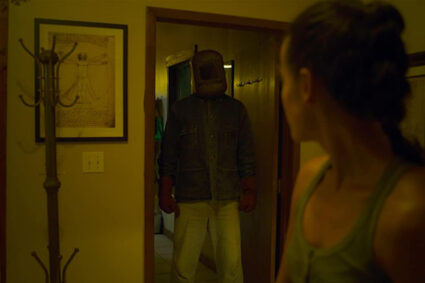
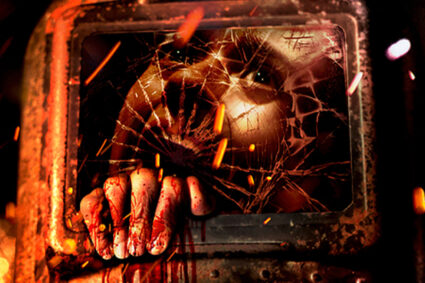
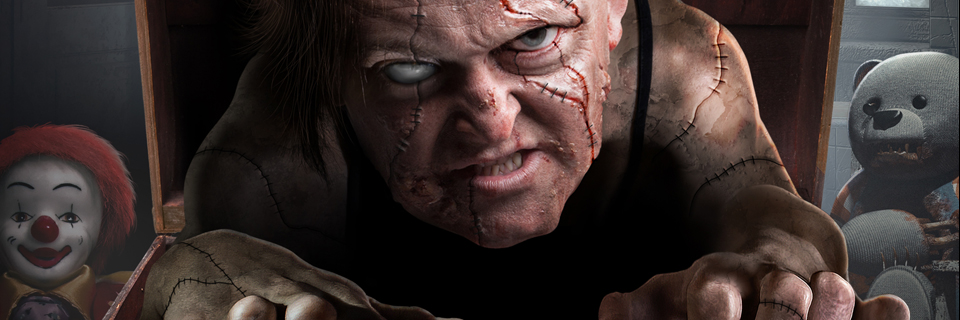










You know, it’s occurred to me many times that if I could do math above a fifth grade level, I might have gotten into medicine, which would have led me down that slippery slope into experimental medicine, which would have led me down that other slippery slope into reanimation of corpses, genetic engineering of beast-men or self-experimentation with unusual transformatory serums. As it is, I’m studying Arabic, and if I could say more than “Me like Cairo it nice city to lived in,” and somebody slipped me the original copy of Alhazred’s Necronomicon (“Kitab Al’Azif”) I would be tempted to intone its dread incantations and open demonic gateways to forbidden worlds. !إيا! كثولو ينام في بيتي في رليح المت If that makes me “condemned,” I don’t want to be commended.
In short, I find your attitude of moral superiority to be as execrable as that of the scientists you judge. In whose hands lies the right of condemnation or commendation? Surely not yours!
Dear Hunter,
Your skills, ambitions, and viewpoints about my article astonish me, and I feel you’re correct on almost all of your points, especially in regards to my piece; however, I see in you what I see in so many genius men which is HUBRIS! Which will be the downfall of us all.
Like the mad scientists I condemned in my piece, your advanced mind conjures thoughts many of us average folk would never dare dream. Its beauty is tragic. For with such an imagination comes a dangerous wonderlust, that will surely lead you to the dark road of temptation upon which so many of the other great minds mentioned in the Deadly Doctor series found themselves.
Please understand that part of my disdain for most of these characters stems from jealously. I have no authority nor any real smarts. I can barely read over a fifth grade level, so when I see these scientific characters waste their God given talents to satisfy their own egos without having the presence of mind to truly comprehend what will happen to the world as the result of their actions, it makes me think about how too many of the real scientists of the world share the same damnable attributes.
I’m not condemning all scientists. I commended Herbert West because I felt that as egotistical as he was, he was more human than the rest of the scientists I profiled. I mean at least towards the end of the carnage he created he could laugh at the situation without his laughter booming with a maniacal tone. He showed some small glimpses of humility, and that’s really all I’m looking for from other people especially mad scientists (I think Frankenstein did too towards the end of the mayhem he was responsible for, but old movies are boring even if they’re considered classics, so fuck Frankenstein. Plus, he was older than Herbert and more established in his field, so he should have known better).
So please, all I ask is that if you do happen upon the Necronomicon think about what will happen when you translate the pages, or at least study Arabic for the better part of ten years so you know exactly how to read the demonic book’s passages before you crack its spine!
Know your field. Know your power. Know your responsibility. And again, as I said in the conclusion of my long-winded, overly-critical critique, if you don’t care about any of those things then you’re well on your way on becoming a mad scientist, and all I can do is hope that you don’t unleash the wickedness that lies within the pages of Necronomicon upon the weak mortal spirit of my pitiful soul.
Thank you for your feedback, and I hope this experience will not turn you away from reading the next Deadly Doctor series I plan to write.
How can it be that the resident physician at Ravenous Monster and Wormwood Chronicles was not consulted for this article?!?
I’ve resurrected enough corpses and created enough human-fish hybrids to know a thing or two about medical malpractice. Indeed, I have written extensively about the subject, which you can see at the link below:
http://www.wormwoodchronicles.com/philm-phreaks/mad-scientist-hall-of-fame
Of course, there are plenty of medical deviants in this world to go around so there are more unplumbed depths of depravity to dig up…
Interesting piece, I was not aware of this. I always wondered if Rotwang (from Metropolis) was his real last name or just a nickname that stuck after he went mental over the loss of his beloved. I mean he looked like he rarely slept, and I’m willing to bet that every waking moment went into the production of his robot lady so he probably never showered either. I’m guessing he smelled awful like hot pennies in a garbage bag full of Chinese food.
Or maybe in the future world of Metropolis Rotwang was slang for cuckold. Personally, I actually try to emulate the style and class of Dr. Bill Cortner in real life.